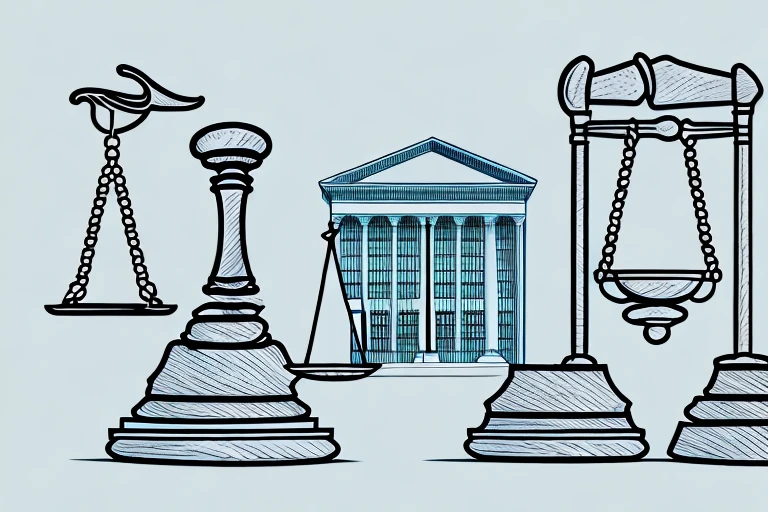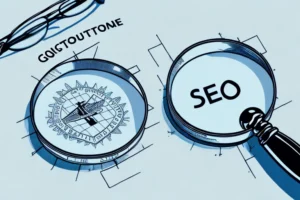
Are you a personal injury lawyer looking to attract more clients and grow your practice? SEO can help you achieve those goals and more! In this article, we will dive into the world of SEO and explore how it can benefit your law firm.
Understanding the Importance of SEO for Personal Injury Lawyers
SEO stands for Search Engine Optimization, which is the practice of improving your website’s visibility on search engines like Google. By targeting specific keywords, optimizing your website’s content, and building high-quality backlinks, you can increase your website’s rankings and attract more targeted traffic.
Why SEO Matters in the Legal Industry
SEO leads have a 14.6% close rate, while outbound leads (such as direct mail or print advertising) have a 1.7% close rate.
(Source: Search Engine Journal)
In today’s digital age, people turn to the internet to search for everything – including personal injury lawyers. In fact, a staggering 96% of people seeking legal advice use a search engine. Therefore, if your website isn’t optimized for search engines, you’ll likely miss out on a lot of potential clients.
Personal injury law is a highly competitive industry, and without a strong online presence, it can be difficult to stand out from the crowd. By investing in SEO, you can improve your website’s rankings and ensure that potential clients can easily find you when they search for personal injury lawyers in your area or other services including wrongful death, workers’ compensation, medical malpractice, or class action attorneys.
Furthermore, SEO can help you establish your credibility and authority in the legal industry. By consistently producing high-quality content and optimizing it for search engines, you can position yourself as a thought leader in your field and attract clients who are looking for an expert to represent them.
Attracting the Right Clients with SEO
One of the biggest advantages of SEO is the ability to target specific keywords that potential clients are searching for. By optimizing your website for these keywords, you can attract high-quality leads who are interested in your services and more likely to convert into paying clients.
For example, if you specialize in representing clients who have been injured in car accidents, you can optimize your website for keywords like “car accident lawyer” and “auto accident attorney”. By doing so, you can ensure that your website appears at the top of the search results when people search for those terms.
It’s important to note that SEO isn’t just about attracting any clients – it’s about attracting the right clients. By targeting specific keywords and optimizing your website’s content, you can attract clients who are looking for the exact services that you offer. This means that you’ll be more likely to attract clients who are a good fit for your firm and who are more likely to be satisfied with your services.
In conclusion, SEO is an essential component of any personal injury lawyer’s marketing strategy. By investing in SEO, you can improve your website’s visibility, attract high-quality leads, and establish your credibility in the legal industry. So if you haven’t already, it’s time to start optimizing your website for search engines!
Keyword Research for Personal Injury Lawyers
Identifying High-Value Keywords
When it comes to personal injury law, identifying the right keywords to target in your SEO campaign is crucial. Using tools like Google Keyword Planner and SEMrush, you can research the keywords your potential clients are searching for and identify the ones that are most relevant and valuable to your business.
For example, if you specialize in car accident cases, you may want to target keywords like “car accident lawyer,” “auto accident attorney,” or “personal injury attorney for car accidents.” By targeting these high-value keywords, you can attract more traffic to your website and improve your chances of converting those visitors into clients.
Long-Tail Keywords for Niche Specializations
If your law firm specializes in a specific type of personal injury, such as slip and fall cases, you can target long-tail keywords that are more specific to your niche. Long-tail keywords are longer, more specific phrases that are less competitive than shorter, more generic keywords.
For example, instead of targeting the keyword “personal injury lawyer,” you could target a long-tail keyword like “slip and fall lawyer in [your city].” By targeting these more specific keywords, you can attract more targeted traffic to your website and improve your chances of ranking higher for those keywords.
Local SEO and Geo-Targeting Keywords
Personal injury law is often location-specific, so it’s important to include geo-targeted keywords in your SEO strategy. By optimizing your website for your city or state, you can attract more local leads and improve your rankings on location-based searches.
For example, if your law firm is located in Los Angeles, you may want to target keywords like “personal injury lawyer in Los Angeles” or “Los Angeles car accident attorney.” By including these geo-targeted keywords on your website and in your content, you can improve your visibility in local search results and attract more potential clients in your area.
In addition to targeting geo-targeted keywords, you can also improve your local SEO by creating content that is specific to your local area. This could include blog posts about local news or events, or pages on your website that highlight your involvement in the local community.
By incorporating these strategies into your keyword research and SEO campaign, you can improve your visibility in search results, attract more targeted traffic to your website, and ultimately, grow your personal injury law practice.
On-Page SEO Best Practices for Personal Injury Law Websites
If you are running a personal injury law firm, having a strong online presence is crucial to attracting potential clients. One of the best ways to achieve this is by practicing on-page SEO, which involves optimizing various elements of your website to improve its rankings on search engine results pages (SERPs). In this article, we will discuss some of the best on-page SEO practices that you can implement for your personal injury law website.
Optimizing Title Tags and Meta Descriptions
As mentioned earlier, title tags and meta descriptions are the first things that potential clients see when they search for your business online. Therefore, it is essential to optimize these elements with relevant keywords and compelling copy to improve your click-through rate (CTR) and attract more targeted traffic to your website.
When crafting your title tags, make sure to include your primary keywords and keep them concise (around 60 characters). Also, try to make them as compelling as possible to entice potential clients to click on your website. Similarly, your meta descriptions should be around 150-160 characters and provide a brief overview of what your website offers. Including your target keywords in your meta descriptions can also help improve your website’s relevance and attract more targeted traffic.
Crafting Compelling and Informative Content
As the saying goes, “content is king” in the world of SEO. Therefore, producing high-quality, informative content should be a top priority for your personal injury law website. Not only does this help establish your law firm as an authority in the industry, but it also improves your website’s rankings and attracts more targeted leads.
When creating content for your website, make sure to provide valuable resources for your potential clients. This can include informative blog posts, FAQs, case studies, and more. Additionally, optimizing your content for relevant keywords can help improve your website’s rankings on SERPs. However, make sure to avoid “keyword stuffing,” which is the practice of overusing keywords in your content to manipulate search engine rankings. This can result in penalties from search engines, which can harm your website’s SEO efforts.
Proper Use of Header Tags (H1, H2, H3)
Header tags (H1, H2, H3, etc.) are an essential element of on-page SEO. They help search engines understand the structure and hierarchy of your content, making it easier for them to crawl and index your website. Therefore, using header tags properly can improve your website’s readability and SEO value.
When using header tags, make sure to use them in a logical and hierarchical order. For instance, your main heading should be an H1 tag, followed by subheadings with H2 tags, and further subheadings with H3 tags. This not only helps search engines but also makes it easier for your website visitors to navigate your content.
Image Optimization and Alt Text
Optimizing your website’s images can also help improve its accessibility and overall SEO value. This involves using relevant alt text and file names for your images, which can help search engines understand what your images are about.
When optimizing your images, make sure to use descriptive file names that include your target keywords. Additionally, including relevant alt text for your images can help improve your website’s accessibility for visually impaired users. Alt text should be descriptive and concise, explaining what the image is about in a few words.
Implementing these on-page SEO best practices can help improve your personal injury law website’s rankings on search engine results pages and attract more targeted traffic to your website. However, keep in mind that SEO is an ongoing process, and it may take some time to see results. Therefore, make sure to track your website’s performance regularly and make adjustments as needed.
Off-Page SEO Strategies for Personal Injury Lawyers
As a personal injury lawyer, it is important to have a strong online presence to attract potential clients. While on-page SEO strategies focus on optimizing your website and content, off-page SEO strategies focus on building your website’s authority and credibility through external factors. Here are some effective off-page SEO strategies for personal injury lawyers:
Building High-Quality Backlinks
Backlinks are an important off-page SEO factor, as they signal to search engines that other websites consider your content valuable and authoritative. However, not all backlinks are created equal. It is important to focus on building high-quality backlinks from relevant websites in your industry. For personal injury lawyers, this could mean reaching out to medical professionals or organizations that specialize in helping victims of accidents. By building these relationships and earning high-quality backlinks, you can improve your website’s domain authority and attract more targeted traffic.
Leveraging Legal Directories and Citations
Listings in legal directories and citations from reputable websites can also help establish your law firm’s credibility and authority online. These directories could include Avvo, FindLaw, and Justia. By ensuring your law firm’s information is up-to-date and consistent across these directories and citations, you can improve your online visibility and attract more targeted leads. Additionally, you can leverage local directories such as Yelp and Google My Business to further improve your local search ranking.
Social Media and Online Reputation Management
Managing your law firm’s online reputation is an important part of any SEO strategy. Social media platforms such as Facebook, Twitter, and LinkedIn are great ways to engage with potential clients and establish your law firm as a thought leader in the industry. By actively engaging with your followers, you can improve your online reputation and attract more targeted leads. Additionally, it is important to monitor and respond to reviews on platforms such as Yelp and Google My Business to ensure your law firm’s reputation remains positive.
By implementing these off-page SEO strategies, personal injury lawyers can improve their online presence, attract more targeted traffic, and ultimately, increase their client base.
Final Thoughts
SEO can help your personal injury law firm attract more targeted traffic, generate more leads, and grow your business. By following these best practices and staying up-to-date on the latest trends and tactics, you can improve your website’s rankings and establish your law firm as a leader in the industry.






